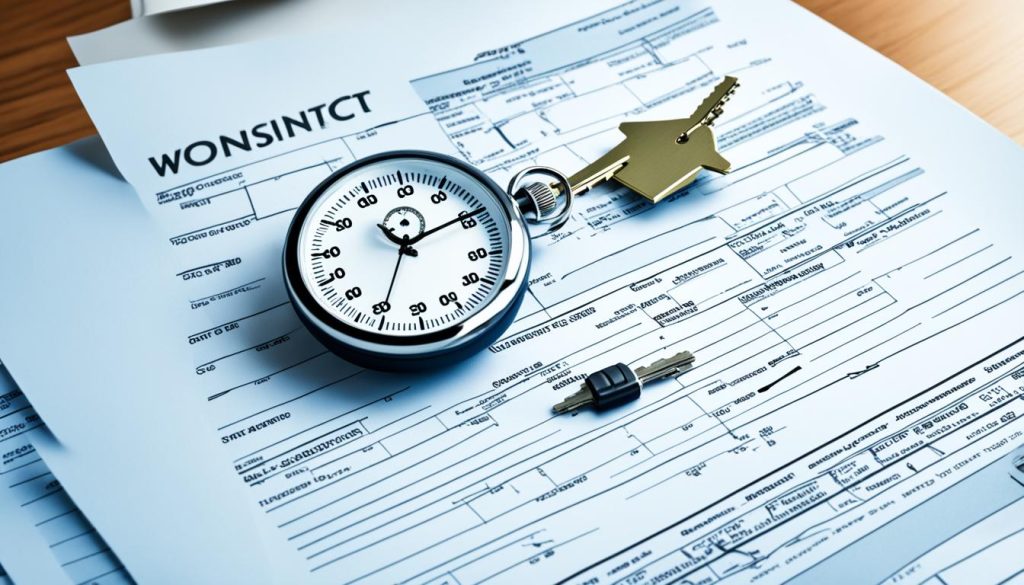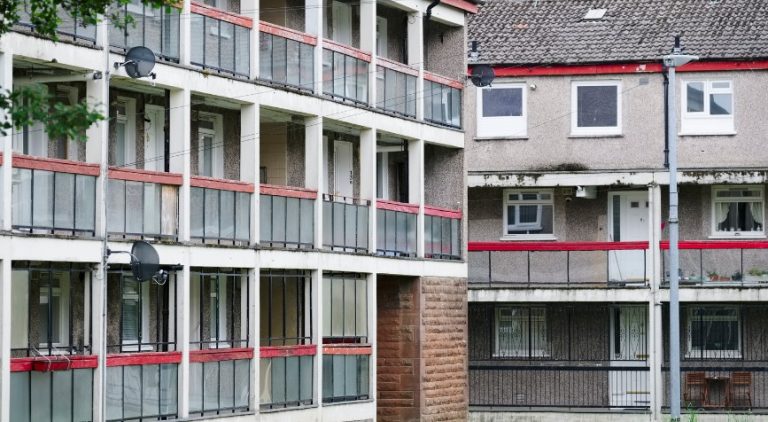Welcome to our guide on the timeline for exchanging contracts in the UK property market. If you’re buying or selling a home, understanding the average time it takes to exchange contracts is crucial for planning and managing your transaction effectively. In this article, we will delve into the factors that can affect the duration of the contract exchange process, provide an overview of the steps involved, and offer tips for a smooth and efficient exchange.
Before we delve into the details, let’s explore the how long does it take to exchange contracts and the factors that can impact contract exchange time. It’s important to note that the duration can vary depending on various circumstances, such as the complexity of the transaction, the presence of a chain, and any legal or financial issues that may arise.
By understanding the factors affecting contract exchange time, you can better navigate the process and ensure a timely and successful exchange. So, let’s dive in and explore everything you need to know about the timeline and factors influencing contract exchange in the UK property market.
Process of Exchange Contracts
Exchanging contracts is a fundamental step in the property buying process in the UK. It signifies a legally binding agreement between the buyer and seller, laying the groundwork for the completion of the transaction. In this section, we will outline the process of exchanging contracts, highlighting the essential steps involved and providing an overview of the typical duration it takes to complete this stage.
Step 1: Offer Acceptance and Conveyancing
The process of exchanging contracts begins with the buyer making an offer on a property. Once the seller accepts the offer, both parties appoint solicitors or conveyancers to handle the legal aspects of the transaction. These legal professionals will ensure that all necessary searches, surveys, and checks are conducted to safeguard the interests of the buyer and seller.
Step 2: Drafting and Reviewing Contracts
The solicitors or conveyancers will then proceed to draft the contract of sale, which outlines the terms and conditions of the property transfer. The buyer’s solicitor will carefully review the contract and negotiate any necessary amendments or additional clauses to protect the buyer’s interests.
Step 3: Exchange of Contracts
Once both parties are satisfied with the contract, the next step is the exchange of contracts. This typically involves the buyer and seller signing identical copies of the contract and exchanging them. The buyer’s solicitor will also transfer the deposit to the seller’s solicitor at this stage.
Step 4: Cooling-Off Period and Completion
After the exchange of contracts, there is generally a cooling-off period of 14 days during which the buyer can withdraw from the transaction without any significant financial consequences. Once this period has passed, the transaction moves towards completion, which involves the transfer of ownership, payment of the remaining balance, and the collection of keys.
The duration of the contract exchange process can vary depending on various factors, including the complexity of the transaction, the responsiveness of all parties involved, and any unforeseen legal or financial issues that may arise. On average, the process of exchanging contracts can take anywhere from several weeks to a few months.

Throughout the process of exchanging contracts, effective communication and coordination between the buyer, seller, and their respective solicitors or conveyancers is crucial. Proactive involvement and prompt response to any queries or requests can help expedite the process and minimize any potential delays.
Next, we will delve into the various factors that can impact the time it takes to exchange contracts, shedding light on the intricacies of this critical stage in the property buying journey.
How Long Does It Take to Exchange Contracts in UK?
When it comes to exchanging contracts in the UK property market, the timeline can vary depending on the specific circumstances of the transaction. In this section, we will provide an overview of the average timeframes for contract exchange in different scenarios, taking into account factors such as straightforward transactions, chains, and additional legal processes.
1. Straightforward Transactions
In a straightforward transaction where there are no dependencies on other property sales or purchases, the timeline for contract exchange is typically quicker. On average, it can take anywhere from 4 to 8 weeks to exchange contracts in these cases.
2. Transactions with Chains
Transactions that involve a chain, where multiple properties are being bought and sold simultaneously, tend to have more complexity and can therefore take longer to exchange contracts. The timeline for contract exchange in these scenarios can range from 8 to 12 weeks, depending on the length of the chain and the efficiency of all parties involved.
3. Additional Legal Processes
In certain situations, there may be additional legal processes that need to be completed before the contract exchange can take place. These processes may include lease extensions, dealing with listed buildings, or resolving boundary disputes. The timeframes for contract exchange in these cases can vary significantly, with some transactions taking several months to complete.
It’s important to note that these timeframes are averages and can be influenced by various factors, such as the responsiveness of solicitors, the complexity of the transaction, and any unforeseen delays or issues that may arise. Effective communication and proactive management of the transaction can help minimize the time it takes to exchange contracts.
To provide a clear visual representation of the different timelines for contract exchange, let’s take a look at the following table:
| Scenario | Average Timeframe for Contract Exchange |
|---|---|
| Straightforward Transactions | 4 to 8 weeks |
| Transactions with Chains | 8 to 12 weeks |
| Additional Legal Processes | Varies (several weeks to several months) |
As seen in the table above, the average timeframes for contract exchange can vary significantly depending on the specific circumstances of the transaction. It’s important for buyers and sellers to be aware of these timelines and plan accordingly to ensure a smooth and timely exchange of contracts.
Maximum Time Between Exchange and Completion UK
In the UK, there is indeed no legal maximum time that dictates how long can be set between the exchange of contracts and completion in a property transaction.
Key Points to Consider:
Flexible Duration: The duration is generally flexible and can be mutually agreed upon by both the buyer and seller.
Customary Practices: While many transactions complete within 2 to 4 weeks after exchange, it can be longer or shorter depending on the circumstances and preferences of the parties involved.
Considerations for Timing: Factors such as financial arrangements, personal situations, or the presence of a property chain can influence the agreed timeframe.
Legal Commitment: Once contracts are exchanged, both parties are legally bound to the sale, making it crucial to agree on a completion date that works for everyone.
Shortest Time Between Exchange and Completion
The shortest time between the exchange of contracts and completion in the UK can indeed range from 1 day to 2 weeks, depending on the circumstances. Here are some details:
1. 1 Day:
In urgent cases, such as when both parties are highly motivated (e.g., due to relocation or financial reasons), it is possible to complete the transaction the day after exchanging contracts. This requires that all necessary arrangements, such as mortgage approvals and funds transfer, are in place beforehand.
2. Up to 2 Weeks:
A 1- to 2-week timeframe for completion is quite common, especially when both parties have agreed to this schedule during negotiations. It allows enough time for practical arrangements while still being relatively quick.
Factors That Can Affect the Time to Exchange Contracts
When it comes to exchanging contracts in the UK property market, there are several factors that can impact the duration of this crucial stage in the home-buying process. It’s important to be aware of these factors to better understand the potential delays and plan accordingly.
1. Complexity of the Transaction
The complexity of the transaction is one of the key factors that can affect the time it takes to exchange contracts. For instance, if the property has unique features or if there are special conditions involved, it may require more time to complete all the necessary checks and paperwork.
2. Presence of a Chain
In a property transaction, a “chain” refers to a sequence of linked buyers and sellers. The presence of a chain can significantly impact the contract exchange time as it requires coordination and agreement among multiple parties. Delays or issues at any point in the chain can cause a domino effect, resulting in a longer overall process.
3. Legal or Financial Issues
Legal or financial issues that arise during the transaction can also lead to delays in exchanging contracts. For example, if there are complications with the mortgage application, disputed property boundaries, or unresolved planning permission matters, these issues will need to be resolved before the contract exchange can take place.
In addition to these factors, external factors such as the current housing market conditions, the availability of solicitors or conveyancers, and even unforeseen events like adverse weather conditions can also impact the time it takes to exchange contracts.
Understanding these factors and being prepared for potential delays can help buyers and sellers navigate the contract exchange process more effectively. By staying proactive, communicating clearly with all parties involved, and seeking professional guidance, you can minimize the impact of these factors and streamline the contract exchange process.

| Factors | Impact |
|---|---|
| Complexity of the transaction | Can lead to additional checks and paperwork, resulting in longer processing time. |
| Presence of a chain | Requires coordination and agreement among multiple parties, increasing the risk of delays. |
| Legal or financial issues | Complications in these areas may prolong the contract exchange process. |
| Market conditions | The state of the housing market can influence the overall timeline. |
| Availability of professionals | The availability of solicitors or conveyancers can impact the speed of contract exchange. |
| Unforeseen events | Events like adverse weather conditions may cause unexpected delays. |
Importance of Proactive Communication in Expediting Contract Exchange
When it comes to the speed of contract exchange and reducing the contract exchange duration, proactive communication plays a crucial role. Clear and timely communication between all parties involved in the transaction can help expedite the process and ensure a smooth and efficient contract exchange.
Proactive communication involves actively discussing and addressing any potential issues or concerns that may arise during the contract exchange process. By keeping all parties informed and updated, delays can be minimized, and potential obstacles can be resolved in a timely manner.
One way to facilitate proactive communication is by establishing open lines of communication early on in the transaction. This can be achieved through regular phone calls, emails, or even virtual meetings to discuss the progress of the contract exchange and address any questions or concerns promptly.
Furthermore, maintaining transparency throughout the process is crucial. All parties involved should be encouraged to share any relevant information or updates as soon as they become available. This will help identify and resolve any potential issues that may impact the contract exchange timeline.
Another important aspect of proactive communication is ensuring that all documentation and paperwork are completed accurately and promptly. By setting clear expectations and deadlines for document submission, all parties can work together towards a timely contract exchange.
To illustrate the importance of proactive communication in expediting the contract exchange process, consider the following example:

| Benefits | Description |
|---|---|
| Reduced Delays | Proactive communication helps identify and address potential issues early on, minimizing delays in the contract exchange process. |
| Efficient Problem Solving | Open and transparent communication allows for efficient problem-solving, ensuring that any obstacles are resolved quickly. |
| Clear Expectations | Proactive communication establishes clear expectations and deadlines for all parties involved in the transaction, streamlining the contract exchange process. |
| Improved Trust | Regular and open communication fosters trust between all parties, creating a positive and collaborative environment for the contract exchange. |
By prioritizing proactive communication throughout the contract exchange process, buyers, sellers, and other involved parties can significantly contribute to the speed and efficiency of the transaction. Effective communication leads to a smoother exchange, minimizing delays and ensuring a timely completion of the contract exchange.
Tips for Ensuring a Smooth Contract Exchange
When it comes to the process of exchanging contracts in a property transaction, efficiency is key. Minimizing delays and potential issues can help ensure a smooth and timely exchange. Here are some practical tips for both buyers and sellers:
- Be prepared: Before entering into a contract, make sure all necessary paperwork and documentation are in order. This includes having all required legal and financial documents ready and ensuring all parties involved are on the same page.
- Communicate effectively: Clear and proactive communication between all parties can greatly speed up the contract exchange process. Maintaining regular contact with your solicitor, estate agent, and any other relevant parties can help address any potential issues quickly and ensure smooth progress.
- Stay organized: Keep track of all important deadlines and milestones throughout the contract exchange process. Create a checklist and make sure all necessary tasks are completed in a timely manner. This will help avoid any last-minute rush or confusion.
- Consider employing a professional: Hiring an experienced solicitor or conveyancer can greatly expedite the contract exchange process. Their expertise and knowledge of the legal requirements and procedures can help navigate any complex situations and ensure a smooth transaction.
- Review and understand the contract: Take the time to carefully review the contract before signing. Seek professional advice if needed, and make sure you fully understand all terms and conditions.
Example Checklist for a Smooth Contract Exchange:
Follow this checklist to help ensure a smooth contract exchange:
| Task | Action |
|---|---|
| Ensure all necessary paperwork is complete | Check that all required legal and financial documents are in order |
| Communicate with all parties involved | Maintain regular contact with solicitors, estate agents, and other relevant parties |
| Stay on top of deadlines | Keep track of important dates and milestones throughout the process |
| Review the contract thoroughly | Ensure a clear understanding of all terms and conditions |
| Consider professional assistance | Hire an experienced solicitor or conveyancer for expert guidance |
By following these tips and staying proactive throughout the contract exchange process, you can help ensure a smooth and efficient transaction, saving both time and potential headaches.

Seeking Professional Guidance During the Contract Exchange Process
When it comes to the contract exchange process, seeking professional guidance from solicitors, conveyancers, or estate agents can make a significant difference. These experts have the knowledge and experience to navigate the complexities of the process and ensure a smooth transaction.
By enlisting the help of professionals, you can benefit from their expertise in understanding the factors that can affect the time it takes to exchange contracts. They can guide you through the necessary steps, keeping you informed and assisting you in overcoming any potential obstacles that may arise.
Professional guidance can also help you streamline the process of exchanging contracts, minimizing delays and ensuring a more efficient timeline. These experts understand the intricacies of the legal and financial aspects involved, allowing for proactive communication and swift resolution of any issues that may arise.
Additionally, professionals can provide valuable advice throughout the contract exchange process, offering insights and recommendations that align with your specific circumstances. Their expertise can save you time and effort, ensuring that you make well-informed decisions and that your interests are protected.
In summary, seeking professional guidance is crucial to successfully navigate the contract exchange process. With their support, you can overcome challenges and ensure a smooth and efficient transaction. So don’t hesitate to engage the services of solicitors, conveyancers, or estate agents who specialize in property transactions, as they can provide the expertise and support you need to achieve a successful contract exchange.
Conclusion
In conclusion, the process of exchanging contracts in the UK property market is an important and complex stage in buying or selling a property. Understanding the average timeframes and factors that can affect contract exchange is crucial for all parties involved.
Throughout this article, we have discussed the steps involved in the process, the average time it takes, and the various factors that can impact the duration. From the complexity of the transaction to the presence of a chain, each factor can contribute to delays or expedite the contract exchange process.
Proactive communication between all parties is highlighted as a key factor in expediting the contract exchange process. Clear and timely communication can help resolve any issues or concerns that may arise, ensuring a smoother and more efficient exchange.
To ensure a successful contract exchange, it is advisable to seek professional guidance from solicitors, conveyancers, or estate agents. Their expertise and experience can help navigate potential obstacles and ensure a seamless transaction.
FAQ
What is the process of exchanging contracts?
Exchanging contracts is a crucial stage in the property buying process in the UK. Once the offer has been accepted, both the buyer and seller’s solicitors or conveyancers will work together to finalize the details of the contract. This includes conducting searches, reviewing contracts, and arranging a mutually agreeable completion date. Once both parties are satisfied, the signed contracts are exchanged, and the transaction becomes legally binding.
How important is proactive communication in expediting contract exchange?
Proactive communication is crucial in expediting the contract exchange process. Clear and timely communication between buyers, sellers, solicitors, and agents can help avoid unnecessary delays and ensure that all parties are aligned in meeting the necessary requirements. By addressing any issues or potential obstacles promptly and effectively, proactive communication can help streamline the contract exchange process and minimize any potential delays.
What tips can you provide to ensure a smooth contract exchange?
To ensure a smooth contract exchange, there are several tips you can follow. Firstly, it’s important to stay organized and ensure that all necessary documents and paperwork are prepared and submitted promptly. Communicating openly and regularly with all parties involved can help address any concerns or issues promptly. Additionally, being flexible and accommodating with regards to completion dates can help facilitate a smoother process. Finally, seeking professional guidance from solicitors, conveyancers, or estate agents can provide invaluable support and expertise throughout the contract exchange process.
Why is professional guidance important during the contract exchange process?
Professional guidance from solicitors, conveyancers, or estate agents is important during the contract exchange process as they have the knowledge and expertise to navigate any potential legal or financial hurdles that may arise. They can ensure that all necessary paperwork is correctly prepared, reviewed, and submitted within the required timeframes. Additionally, professionals can provide guidance and advice on the best strategies to prevent any unnecessary delays or complications, ensuring a smoother contract exchange process.






